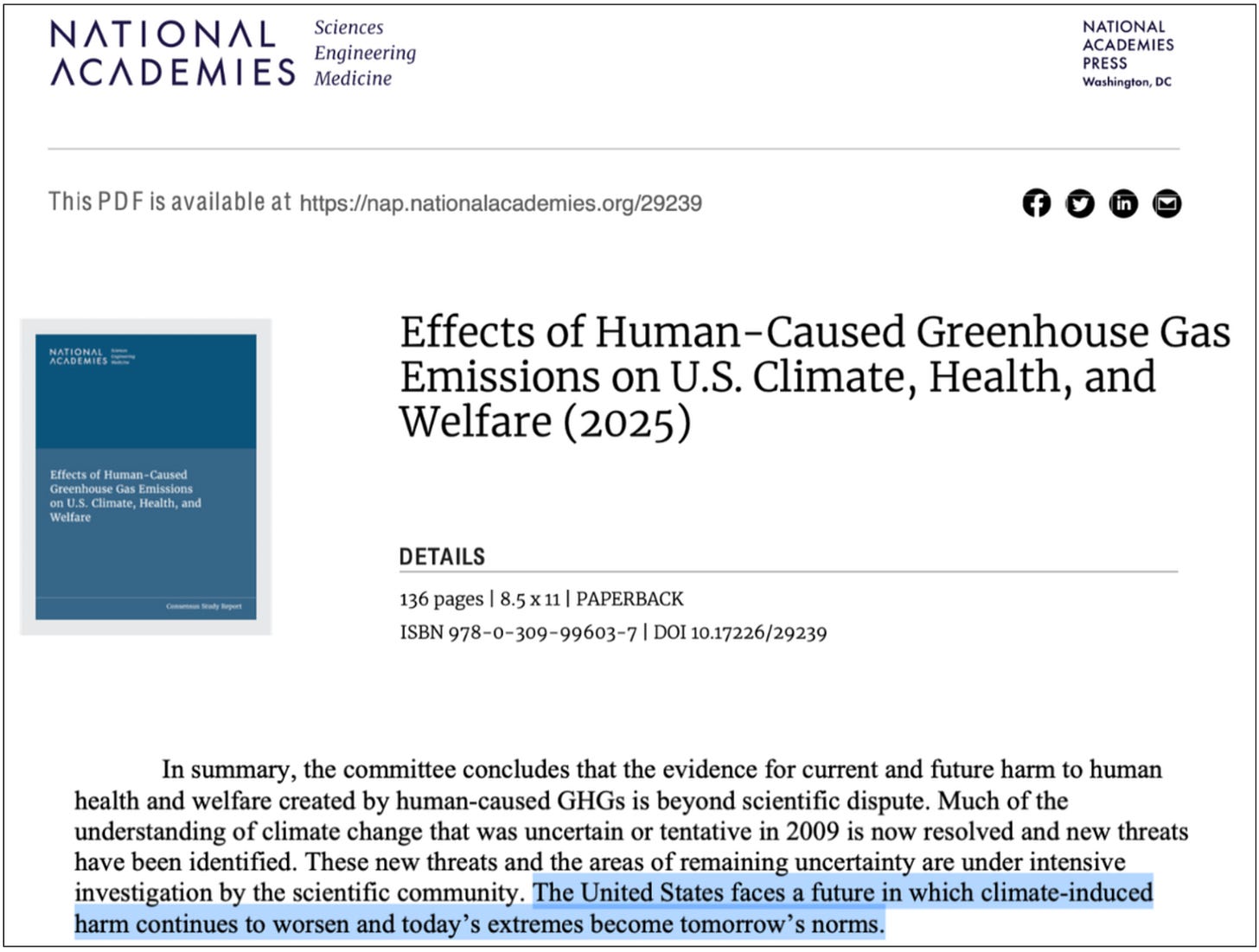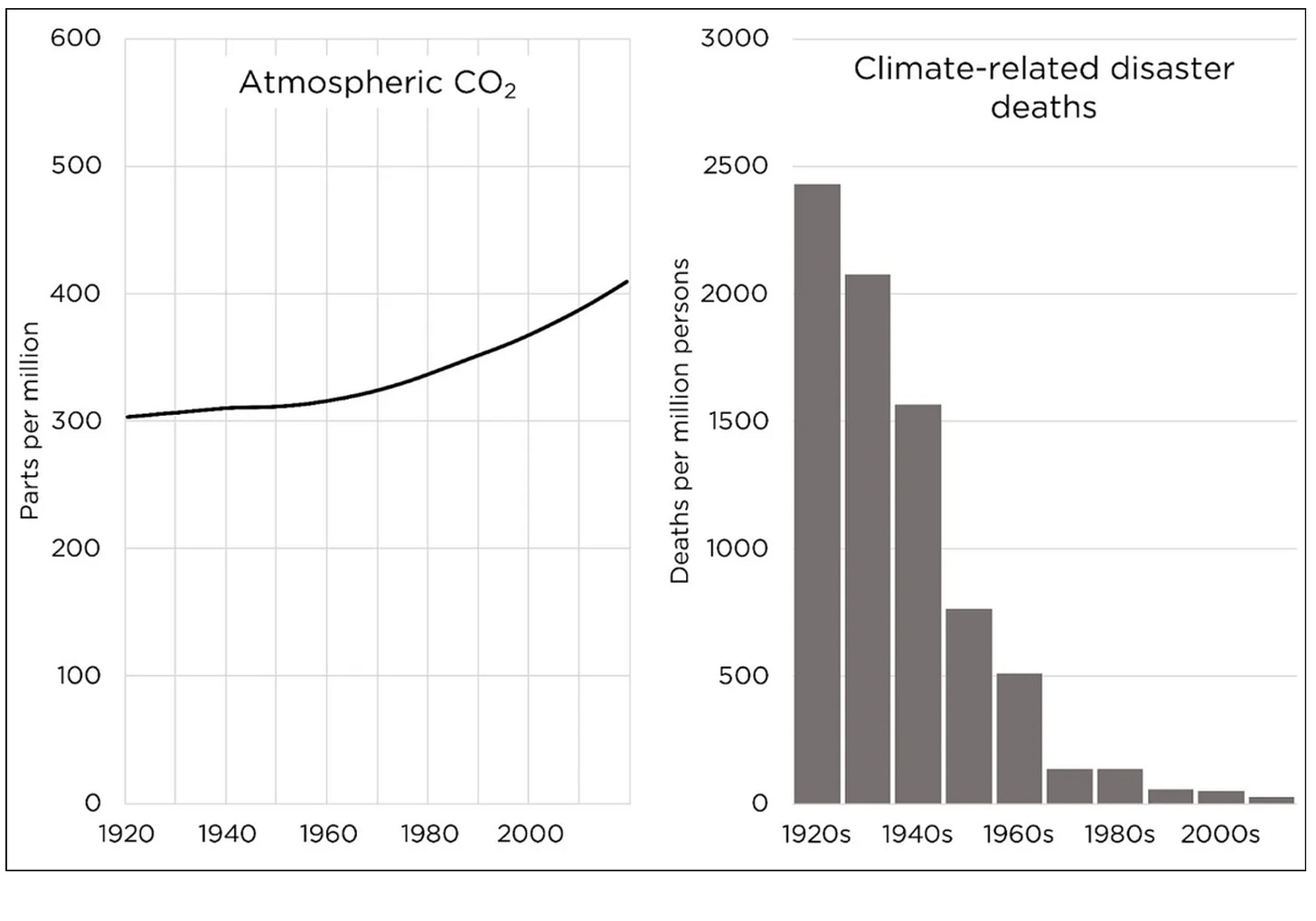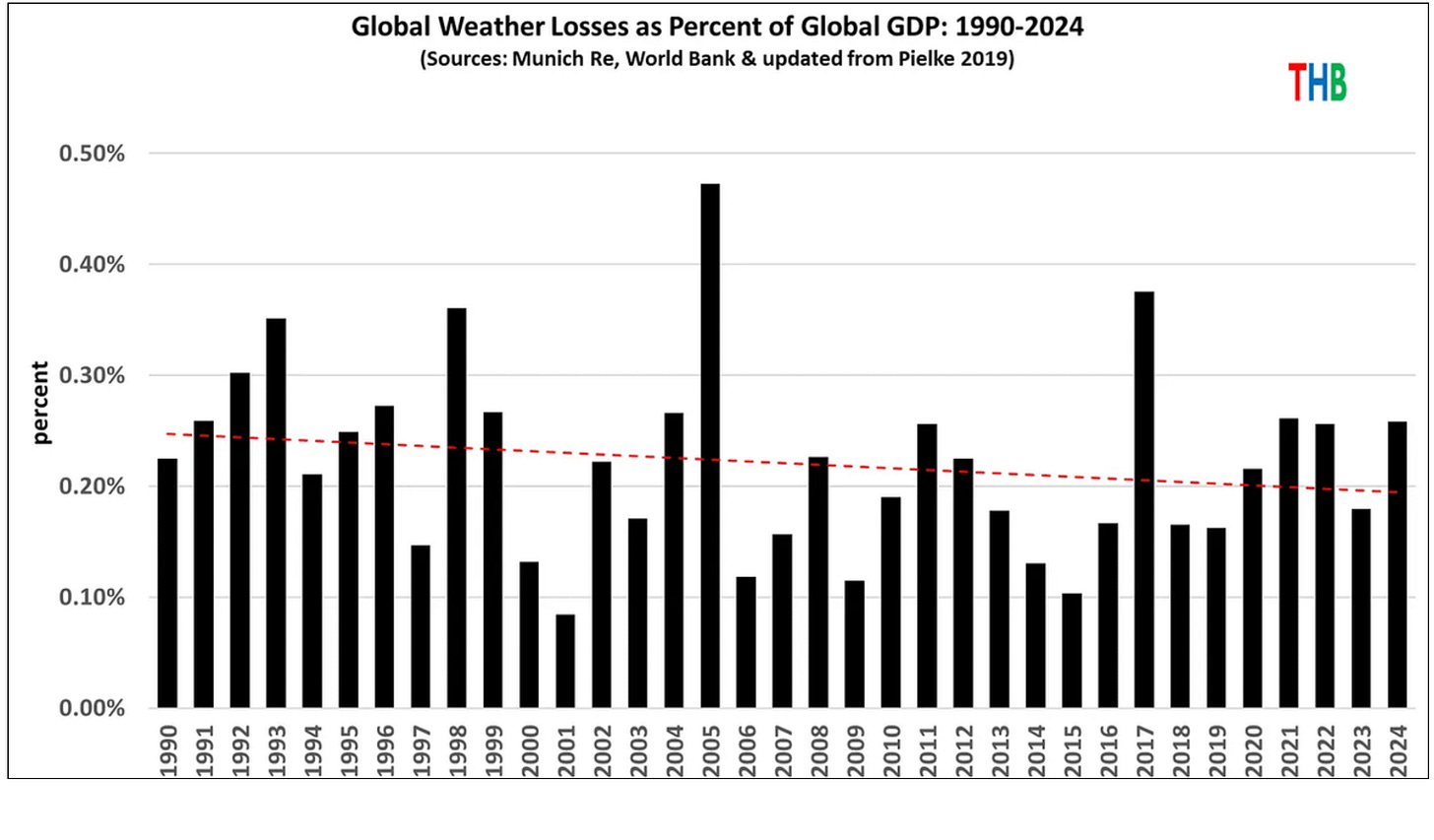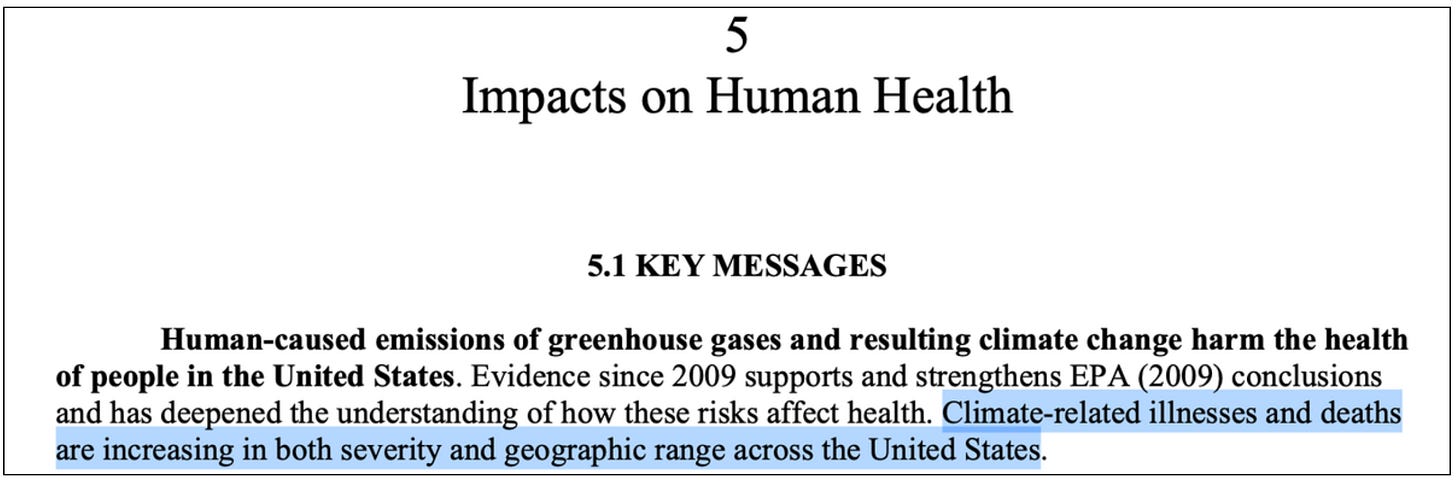The National Academies' perversion of science
A new “report” by the prestigious National Academies engages in heavy fossil fuel benefit denial in order to claim that climate danger is worse than ever.
A new “report” by the prestigious National Academies claims climate danger is worse than ever, even though it is empirically lower than ever.1
How can this happen?
The National Academies commit the fallacy of “fossil fuel benefit denial,” which must be eliminated from policymaking.
Climate danger is lower than ever, thanks in large part to fossil fuels
The empirical state of climate danger today compared to the past is very clear, and very positive.
In recent decades, climate danger has been lower than ever. Climate-related disaster deaths have decreased globally by 98% over the last century.2Not only have climate-related disaster deaths decreased, but GDP-adjusted climate-related damages are flat despite many incentives for them to go up (preferences for riskier areas, government bailouts).3
The dramatic decline in climate danger is due in large part to fossil fuels—which have provided and continue to provide uniquely cost-effective and scalable energy for the amazing machines that protect us against storms, neutralize extreme temperatures, and alleviate drought.
That fossil fuels have driven climate danger to record lows doesn’t contradict the idea that fossil fuels’ GHG emissions impact climate. It means that the climate positives that come along with GHGs—above all what I call “fossil-fueled climate mastery”—far outweigh the negatives.
The National Academies’ “report” portrays climate danger as having gotten far worse
The National Academies just released a “report” supposedly informing government about the relationship between GHGs, climate, health, and welfare. In reality the report is disinformation that falsely portrays climate danger, health, and welfare as worsening due to fossil fuels.
Even though it’s well-documented that human beings have experienced a dramatic decline in climate danger in recent decades and generations, the National Academies claim “climate-induced harm” has gotten worse in recent decades and will continue to “worsen.”
How is this possible?Even though climate danger in the United States and around the world is at a historic low, the National Academies’ “report” claims that “climate-related illnesses and deaths are increasing in both severity and geographic range across the United States.”
What is going on here?The Academies refuse to consider the benefits, including climate benefits, of fossil fuels
The reason the National Academies, a prestigious collection of organizations, are able to come to portray a time of record climate safety as a time of record climate danger, is that it commits a fallacy I call “fossil fuel benefit denial.”4
“Fossil fuel benefit denial” is the fallacy of making policies or evaluations regarding fossil fuels that only consider fossil fuels’ negative side-effects while denying fossil fuels’ massive benefits, including climate benefits.
Benefit denial of any form allows the opponent of something that is a huge net-benefit to portray it as a net-harm.
E.g., the man who portrays his wealthy in-laws as villains by focusing on their flaws while ignoring the vital financial support they give his family.While fossil fuels have clearly driven down climate danger and improved human health and welfare by providing a uniquely cost-effective and scalable form of energy, the Academies makes them look bad by refusing to consider those benefits—only considering negative side-effects.
Can I be sure that the Academies engage in fossil fuel benefit denial to reach their conclusion that climate danger is increasing due to fossil fuels’ GHGs?
Yes, because their report admits it’s not considering the climate, health, or welfare benefits of fossil fuel energy!The report “does not consider the potential of adaptation measures,” an admission that it didn’t factor in how fossil fuels help us master climate danger—even though this mastery has led climate deaths to plummet and thus, far outweighed any negative impact of fossil fuels’ GHGs!
The report “did not take up the question of whether proposed regulations impose an undue economic burden,” an admission it didn’t factor in the huge economic benefits of fossil fuels—including those to health and welfare—that would be lost if we rapidly eliminated GHG emissions.
The Academies’ “report” on climate danger that denies all the ways fossil fuels reduce climate danger is no more valid than a report on polio danger that denies the existence of the polio vaccine and modern sanitation.
No matter how many citations it has, it is disinformation.Some wonks might excuse the Academies’ fossil fuel benefit denial by claiming the legal “endangerment” determination process doesn’t allow considering benefits.
But the Academies aren’t part of that process; their job is to give holistic, informative reports—and they’ve failed.The National Academies, by charter, are supposed to “investigate, examine, experiment, and report upon any subject of science or art,” not take positions on legal or policy disputes.
Their job regarding climate danger is to give us the full picture; they have totally failed to.The National Academies, by charter, are supported to “report upon any subject of science or art” specifically “whenever called upon by any department of the Government.”
No department called upon them re: the “endangerment” question; they inserted themselves to impact policy.There is no excuse for the National Academies abusing their prestige to insert themselves into a regulatory process—and to do so with a trash “report” that falsely portrays climate danger as worsening due to fossil fuels when it is clearly improving due to fossil fuels.
Questions about this article? Ask AlexAI:
Popular links
EnergyTalkingPoints.com: Hundreds of concise, powerful, well-referenced talking points on energy, environmental, and climate issues.
My new book Fossil Future: Why Global Human Flourishing Requires More Oil, Coal, and Natural Gas—Not Less.
“Energy Talking Points by Alex Epstein” is my free Substack newsletter designed to give as many people as possible access to concise, powerful, well-referenced talking points on the latest energy, environmental, and climate issues from a pro-human, pro-energy perspective.
UC San Diego - The Keeling Curve
For every million people on earth, annual deaths from climate-related causes (extreme temperature, drought, flood, storms, wildfires) declined 98%--from an average of 247 per year during the 1920s to 2.5 per year during the 2010s.
Data on disaster deaths come from EM-DAT, CRED / UCLouvain, Brussels, Belgium – www.emdat.be (D. Guha-Sapir).
Population estimates for the 1920s from the Maddison Database 2010, the Groningen Growth and Development Centre, Faculty of Economics and Business at University of Groningen. For years not shown, population is assumed to have grown at a steady rate.
Population estimates for the 2010s come from World Bank Data.






Thanks for posting. Just more propaganda being shoveled by ideologues masquerading as “scientists.”
Focusing on only one type of data instead of looking at the whole picture is a form of cherry-picking data to spread a biased viewpoint. Thanks for exposing it. I lost confidence in the National Academies of Science years ago.